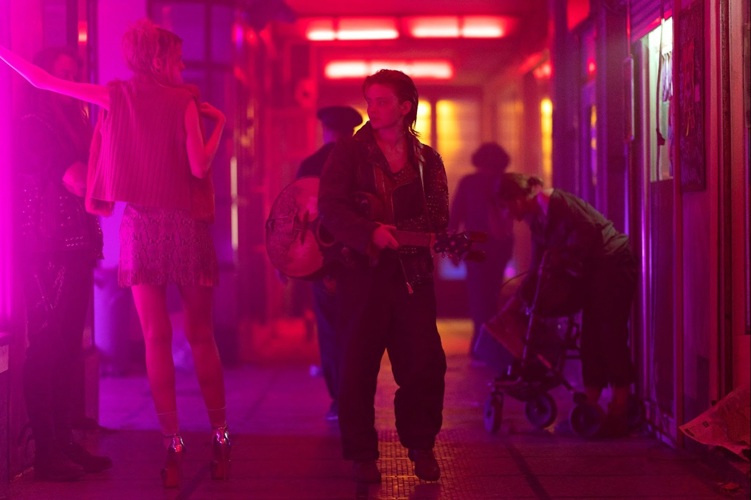SXSW Film Review: "O’Dessa" is a Mesmerizing Rock Opera with Cult Classic Potential
Geremy Jasper’s O’Dessa is a film destined to divide audiences. Blending folk music with dystopian sci-fi, it’s a bold experiment in storytelling, rich in style but not necessarily in narrative satisfaction. While its thematic depth and striking visuals may not resonate with everyone, O’Dessa thrives as an experience—one that leans into its music and world-building to craft something that feels both nostalgic and fresh. The Searchlight Pictures release premiered at SXSW ahead of its March 20th streaming debut on Hulu.
Set in a post-apocalyptic future, O’Dessa follows a young farm girl (Sadie Sink) on a quest to retrieve her stolen family heirloom—a mystical guitar known as the “Willa." Her journey takes her to the neon-drenched wasteland of Satylite City, where she is drawn into a dangerous romance with a charismatic performer (Kelvin Harrison Jr.) and forced to compete in a ruthless, star-making TV competition run by the enigmatic Plutonovich (Murray Bartlett). Blending folk music with dystopian sci-fi, O’Dessa is a surreal rock opera that explores destiny, idol worship, and the transcendent power of song.
From the opening frames, O’Dessa plunges audiences into a world with a distinctly 1980s analog feel—muted, grainy colors, textured production design, and hair and costume choices that evoke a long-lost VHS tape. This extends to the film’s music, which is more acoustic folk and country than full-blown rock, though the industrialized dystopia of Satylite City injects a sharper, more electric energy into the soundscape. The fusion of these elements gives the film a unique sonic identity, reinforcing Jasper’s vision of a “psychedelic folk fantasy."
The film’s strongest asset is undoubtedly its music. Sadie Sink delivers raw, lived-in vocal performances that sell the emotional weight of her character’s journey. With 13 original songs, the soundtrack is packed with tunes that could give the film legs beyond its initial release, much like past cult musicals like The Rocky Horror Picture Show. There’s a lingering sense that, while O’Dessa might not find its audience right away, its music will keep it alive in midnight screenings and playlists for years to come.
The story itself leans into familiar tropes—the hero’s journey, the reluctant chosen one, the dystopian overlord—but with a rock-opera spin. One of the film’s most striking elements is “The One," a twisted talent competition that serves as a mix of American Idol and The Hunger Games. Here, hopefuls compete for fame and survival, subjected to the whims of a system designed to exploit them. This storyline taps into Black Mirror-esque themes of media manipulation and blind devotion, adding a chilling layer to O’Dessa’s otherwise dreamlike aesthetic.
Where O’Dessa excels in mood and music, it stumbles in traditional storytelling. The film is light on character development and at times feels more like a series of beautifully composed vignettes than a cohesive journey. While Sink and Kelvin Harrison Jr. bring passion to their roles, the emotional beats don’t always land with the weight they should. The film’s surreal nature keeps it engaging, but it also creates a sense of detachment, making it harder for audiences to fully invest in O’Dessa’s destiny.
O’Dessa is a bold, strange, and visually arresting film that prioritizes style and sound over conventional storytelling. While its narrative may underwhelm some, its haunting visuals, strong performances, and rich musicality make it a fascinating experiment. Jasper has crafted a world that feels distinctly his own, one that pays homage to 1980s sci-fi oddities while delivering something modern and rebellious. It won’t be for everyone, but for those willing to embrace its rhythm, O’Dessa could be a film worth revisiting—again and again.
I give O’Dessa 3 out of 5 stars.
Searchlight’s O’Dessa begins streaming March 20th on Hulu.


